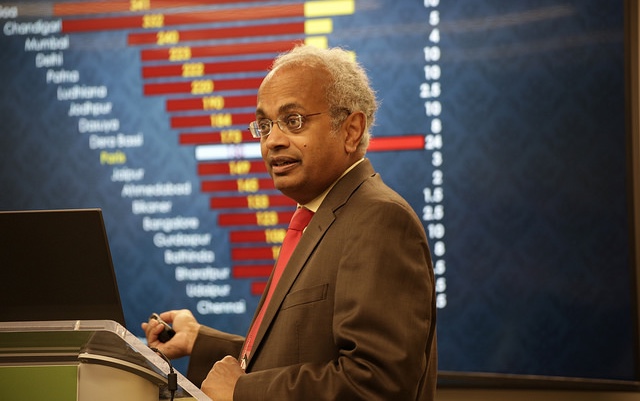How to overcome market failures was once the key question underlying development research. A primary conclusion of this research was that governments had to step in to resolve these market failures, for example by providing free public services or protecting infant industries. However, many of these interventions have themselves failed the poor people they were intended to help. At the recent IFPRI RISE Research Day, Shanta Devarajan, the Senior Director for Development Economics at the World Bank, discussed these complex issues in a keynote address and outlined several key directions for future development research.
Dr. Devarajan opened the keynote address by emphasizing the evolution of development research over time. Development research, he noted, began by searching for solutions to market failures. For example, individuals and other market participants often underinvest in public goods like infrastructure, which are characterized by free-rider problems—but can spur development. Similarly, individuals may underinvest in goods like education and healthcare given the existence of positive externalities—benefits to other members of society from investments that go beyond any benefits to the individual herself.
Many of the proposed solutions to market failures, Dr. Devarajan noted, emphasized the role of government. Providing free public education and health care, in theory, encourages more people to use these services and delivers broad benefits for individuals and society. Protecting infant industries from international competition gives firms time to coordinate investments and learn-by-doing.
Yet, Dr. Devarajan devoted the rest of his address to outlining the many ways in which these governmental interventions have failed the poor. In short, addressing market failures often gives way to government failures. He listed many examples. In India, free public education has increased school enrollment, yet learning outcomes are declining over time. (One reason could be high rates of teacher absenteeism, he said.) Public health clinics in many developing countries are targets for corruption: in Chad, a 2004 study found that 99 percent of health clinic funds go missing.
While large public investments have been made in infrastructure, Dr. Devarajan noted, their benefits sometimes fail to reach the poor. While it seems intuitive that the number of hours water is available per day to city residents should be based on the actual supply of water, there is in fact little relationship between the two. Availability is much more a function of government management than water volume. More troubling still is the fact that service delivery failures force poor citizens to turn to the private sector, undermining a key rationale behind making public investments in the first place.
Roads in Africa provide another troubling example. At one point, there were good economic rationales to protect trucking companies from competition because trucking was considered a natural monopoly, but technological advances and economic growth have wiped out these rationales. Nonetheless, such protections persist across the continent: They provide extremely high profit margins to politically-connected trucking companies while harming average citizens by making transportation costs some of the highest in the world.
Why do these government failures occur and what can be done about them? Dr. Devarajan offered several potential answers. Poor incentives likely play a role: When absentee teachers get paid regardless of whether or not they show up to work, the practice may become so common and systemic that individuals are not even embarrassed to not do their jobs. Doctors working in public clinics can make more money by diverting citizens to their private practices, where they can collect fees. Politicians are unlikely to break up monopolies or encourage competition when the individuals and businesses benefitting from them help keep the politicians in power.
In the face of governmental failures, one approach is to improve governmental accountability to poor citizens through improved access to information. Dr. Devarajan highlighted an example from rural Uganda. In 1995, a survey found that only 13 percent of grants intended for primary schools actually reached their intended targets. The government published this information, prompting a cascade of public demands for more information. Citizens demanded to know how much money was going missing in their own districts and ultimately from their own schools. In the end, schools began publicly posting budgets on their doors. After 4 years, 90 percent of the intended grants were reaching schools. The story is a hopeful one: Armed with new information, citizens succeeded in pressuring government agencies to deliver services.
However, Dr. Devarajan also emphasized that there are no “magical solutions.” We still know little about how information matters for improving service delivery. For example, which sources of information do citizens find most credible? When and how should information be delivered so that citizens can effectively use it to push for accountability? What types of institutions enable or deter citizens from using such information to press for action? What can be done when service delivery failures are common knowledge, yet this information has not catalyzed citizen action? In these cases, broader political or institutional reforms may be necessary to effectively channel citizen demands. These questions present promising avenues for future IFPRI research. They also make clear the need to understand the specific country context and actors in play, as well as the incentives affecting how well they deliver services to the poor.
Katrina Kosec is a Senior Research Fellow and Jordan Kyle is an Associate Research Fellow in IFPRI’s Development Strategy and Governance Division.







